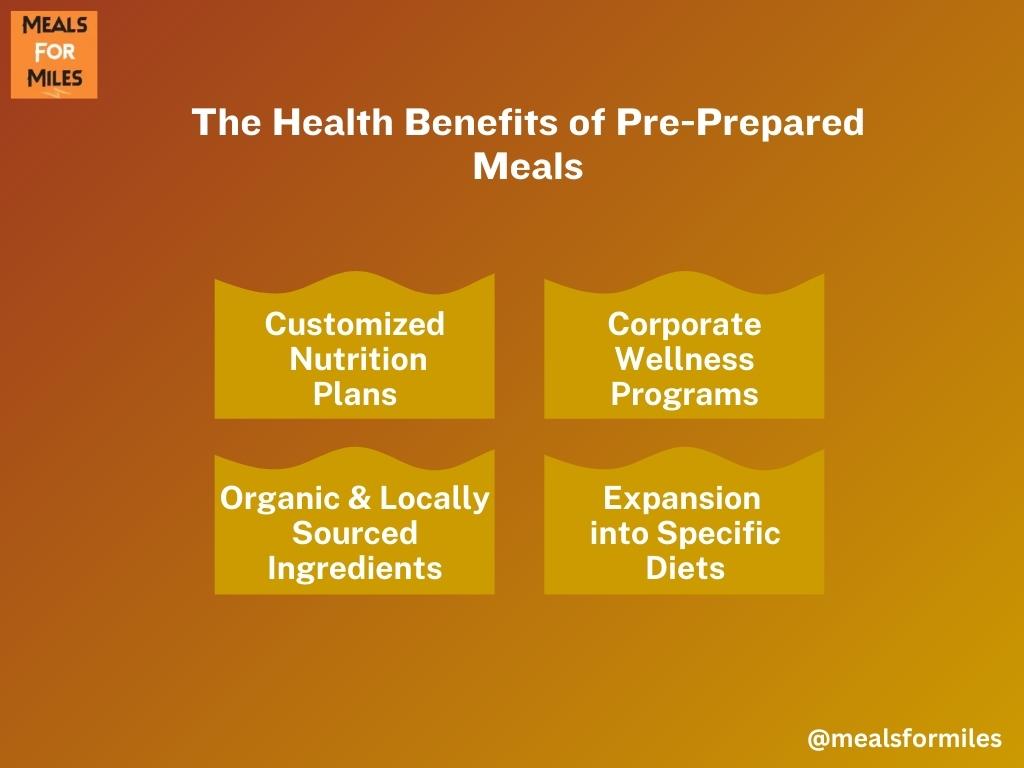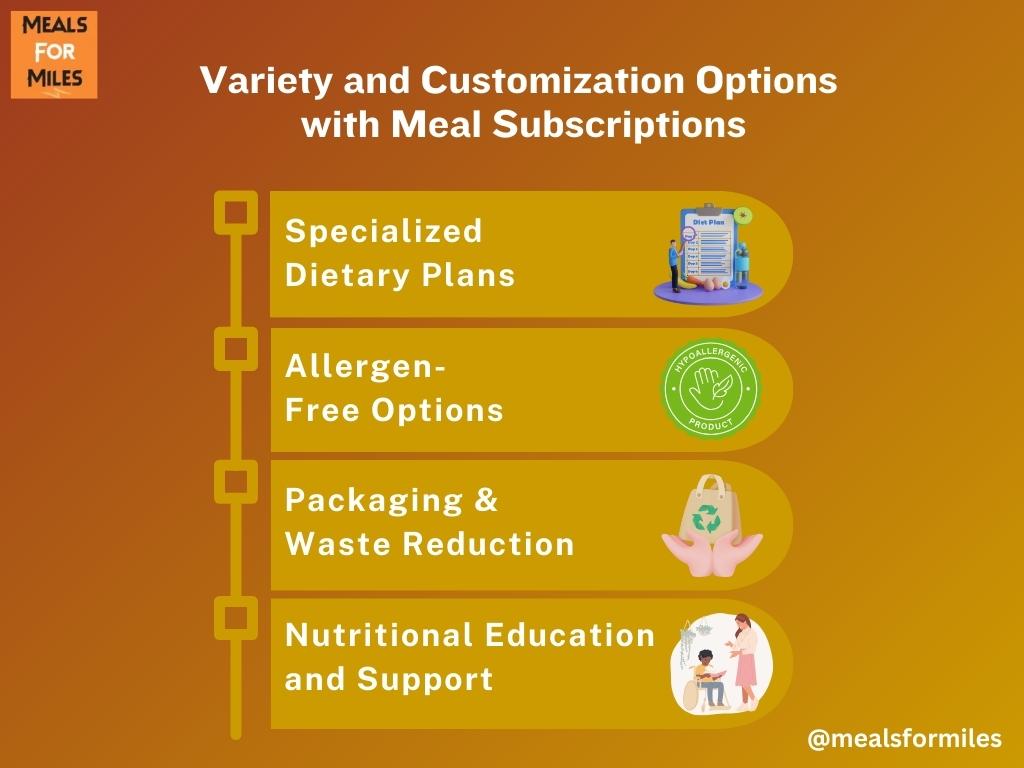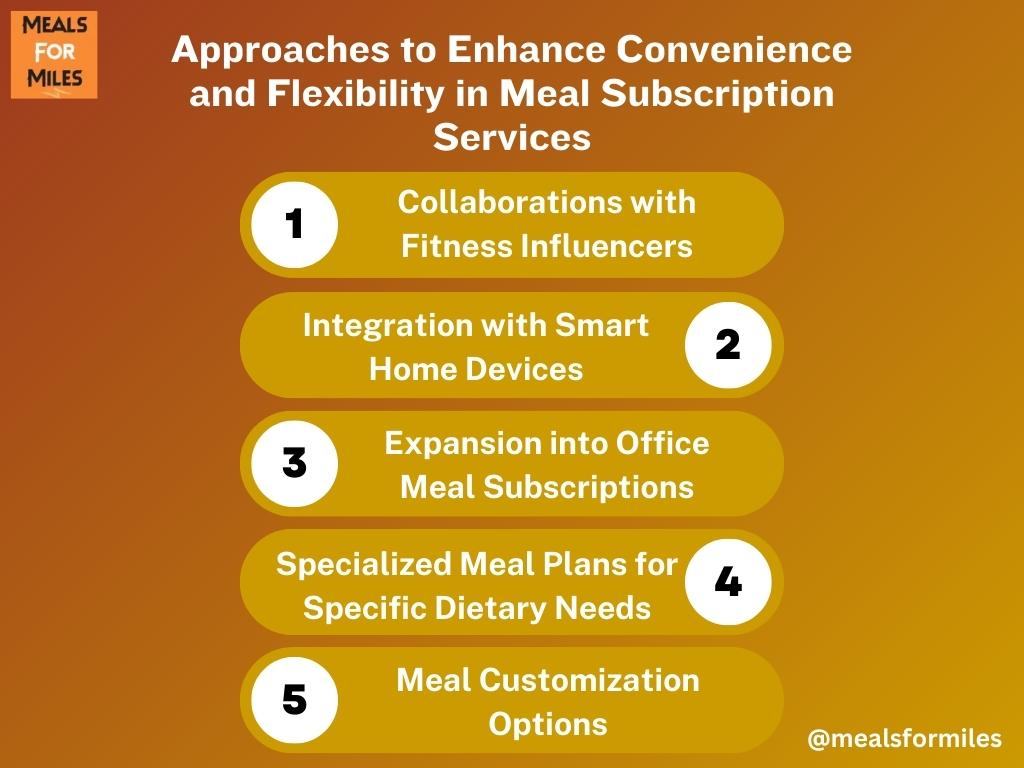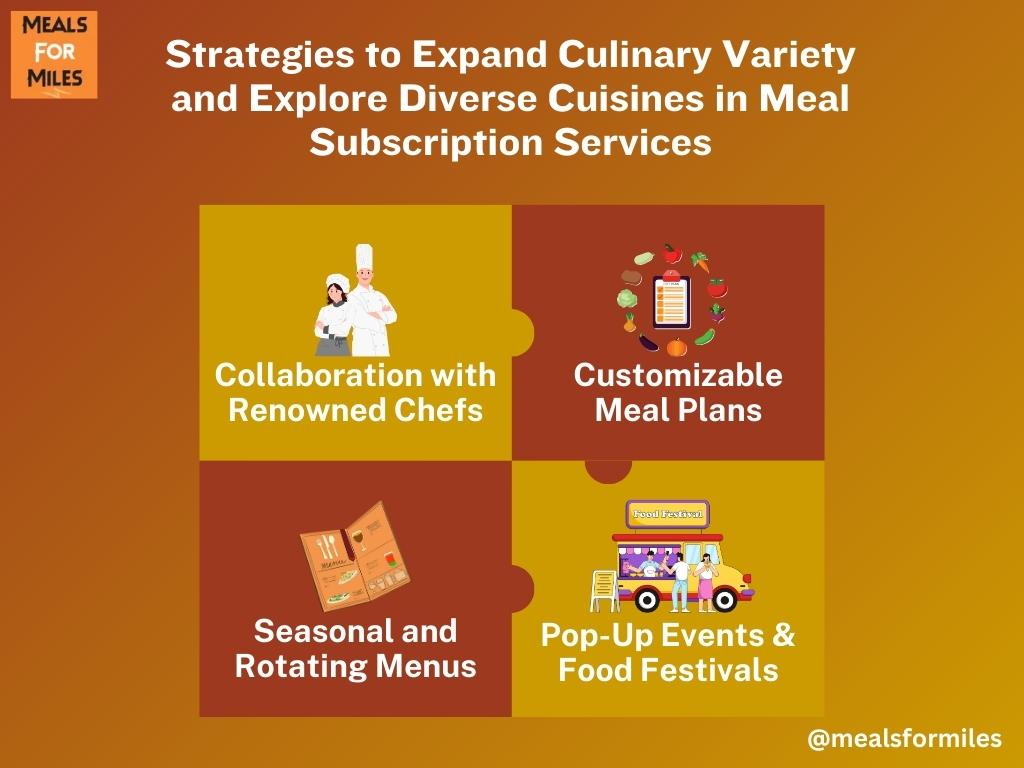Are you ready to revolutionize the way you eat, save time, and prioritize your health?
Embrace the future of dining with our meal subscription services!
Meal subscription services have gained popularity due to their convenience and health benefits. They offer pre-prepared meals delivered to your doorstep, saving time and providing access to nutritious options. These services also offer cost savings, variety, and customization, making them appealing to busy individuals. Transparency in nutritional information and quality ingredients is another advantage.
Meal subscriptions introduce variety in diets, offering diverse cuisines and flavors. Additionally, these services promote sustainability by using recyclable packaging and reducing carbon emissions. Overall, meal subscription services cater to health-conscious consumers’ needs, offering convenience, affordability, and responsible food choices.
Table of Contents
- Introduction to Meal Subscription Services
- The Health Benefits of Pre-Prepared Meals
- Cost Savings of Meal Subscription Services
- Variety and Customization Options with Meal Subscriptions
- Time Savings of Preparing Home Cooked Meals with a Service
- Convenience and Flexibility for Busy Schedules
- Nutritional Information and Quality Ingredients Used in Prepared Meals
- Increased Variety in Diet with Different Cuisines Offered by Services
- Sustainability Benefits Of Using Meal Subscription Services
- Final Thoughts
Introduction to Meal Subscription Services
Meal subscription services have become increasingly popular in recent years as health-conscious consumers look for convenient and affordable ways to eat healthy. Meal subscription services are a type of food delivery service that delivers pre-prepared meals directly to customers’ homes. Customers can choose from a variety of meal plans and order meals online or through an app. The convenience and flexibility of meal subscriptions make them an attractive option for people who want to maintain a healthy diet without spending hours in the kitchen preparing meals.
The Health Benefits of Pre-Prepared Meals
Meal subscription services, such as pre-prepared meals, have various health benefits. They are lower in calories compared to restaurant dishes, making them suitable for calorie-controlled diets. They also contain higher levels of vitamins and minerals due to fresh ingredients, promoting overall well-being. Additionally, these services reduce food waste by providing portioned servings that are more likely to be consumed entirely by the consumer.
Here are the 10 Strategies for Maximizing Health Benefits with Pre-Prepared Meal Services:
- Customized Nutrition Plans: Pre-prepared meal services can work with nutritionists and dietitians to create customized meal plans that cater to specific dietary needs and health goals.
- Weight Management Programs: Meal subscription services can partner with fitness centers and weight loss clinics to offer comprehensive weight management programs. These programs can include pre-prepared meals that are portion-controlled and nutritionally balanced, along with exercise routines and counseling sessions.
- Healthy Meal Delivery for Seniors: Pre-prepared meal services can specifically target the elderly population, providing them with nutritious, easy-to-prepare meals that help meet their specific dietary requirements. This can be particularly helpful for seniors who may have difficulty cooking or grocery shopping.
- Collaborations with Health Professionals: Meal subscription services can partner with healthcare providers, hospitals, and wellness centers to support patients in their recovery or management of chronic conditions. By offering pre-prepared meals that align with specific nutritional guidelines, these services can play a crucial role in improving patient outcomes.
- Corporate Wellness Programs: Companies can incorporate pre-prepared meal services as part of their employee wellness initiatives. By providing healthy meal options, employers can promote better nutrition and overall well-being among their workforce, leading to increased productivity and reduced healthcare costs.
- Nutritional Education and Support: Pre-prepared meal services can go beyond just delivering meals and offer educational resources, such as cooking tips, nutritional information, and recipe ideas. This can empower customers to make healthier choices and develop sustainable eating habits in the long run.
- Organic and Locally Sourced Ingredients: Meal subscription services can focus on sourcing organic and locally grown ingredients to enhance the health benefits of their meals. This would not only support sustainable farming practices but also provide customers with fresher, more nutrient-rich food options.
- Allergy-Friendly Meal Plans: Pre-prepared meal services can cater to individuals with food allergies by offering specialized meal plans that exclude common allergens. This can provide a convenient and safe option for those who need to follow strict dietary restrictions.
- Expansion into Specific Diets: Meal subscription services can expand their offerings to include specific diets such as vegetarian, vegan, keto, or paleo. This would cater to individuals who follow these dietary lifestyles and provide them with a convenient and varied selection of meals that meet their nutritional requirements.
- Collaborations with Fitness Influencers: Pre-prepared meal services can collaborate with fitness influencers and experts to create meal plans that complement specific workout regimens. This can help individuals achieve their fitness goals by providing them with the right balance of macronutrients and essential vitamins and minerals.
Cost Savings of Meal Subscription Services
Meal subscription services can save consumers money compared to traditional grocery shopping and dining out. They provide portioned ingredients, reducing waste and preventing impulse purchases. These services also negotiate bulk discounts with suppliers, resulting in lower costs for customers. By having meals planned and prepped, subscribers can avoid the expense of eating out or ordering takeout. Overall, meal subscription services offer a cost-effective and convenient option for saving money on food expenses.
Here are the 10 Strategies for Cost Savings and Efficient Budgeting with Meal Subscription Services:
- Collaboration with Local Farmers and Suppliers: Meal subscription services can partner with local farmers and suppliers to source fresh, seasonal ingredients at lower costs. This not only supports local businesses but also helps to reduce transportation and storage expenses.
- Customizable Meal Plans: Offering customizable meal plans allows subscribers to choose their preferred portion sizes and ingredients, reducing food waste and ensuring they only pay for what they need. This helps customers save money by avoiding buying larger quantities of ingredients that may go unused.
- Bulk Purchasing and Negotiating Discounts: Meal subscription services can leverage their customer base to negotiate bulk discounts with suppliers. By purchasing ingredients in large quantities, they can pass on these savings to customers, enabling them to enjoy lower meal costs.
- Waste Reduction Initiatives: Meal subscription services can implement waste reduction initiatives, such as providing recipes that use leftovers or offering options for repurposing ingredients in different meals throughout the week. This helps customers make the most of their ingredients and reduces the need to purchase additional items.
- Economies of Scale: As meal subscription services grow and attract more customers, they can benefit from economies of scale. This means they can purchase ingredients and packaging materials at lower costs due to increased order volumes, allowing for even greater savings for customers.
- Efficient Meal Planning and Prep: By providing pre-portioned ingredients and detailed recipes, meal subscription services save customers time and money by eliminating the need to plan and shop for meals. The convenience of having meals planned and prepped also reduces the likelihood of impulsive and costly takeout or dining out.
- Flexibility in Subscription Options: Offering flexible subscription options, such as weekly or monthly plans, allows customers to choose a plan that aligns with their budget and lifestyle. This flexibility allows subscribers to save money by adjusting their subscription based on their needs and preferences.
- Special Discounts and Promotions: Meal subscription services can offer special discounts and promotions to attract new customers or reward loyal ones. This can include introductory offers, referral programs, or occasional discounts on specific meal plans, further enhancing the cost-saving benefits for consumers.
- Collaboration with Nutritionists or Dietitians: Partnering with nutritionists or dietitians can help meal subscription services create well-balanced and healthy meal options. By offering nutritionally balanced meals, customers can avoid spending money on additional supplements or specialized diet plans.
- Zero-Waste Packaging: Implementing sustainable and reusable packaging options can help meal subscription services reduce packaging costs and waste. This, in turn, allows them to offer cost savings to customers while also appealing to environmentally-conscious consumers.
Variety and Customization Options with Meal Subscriptions
Meal subscriptions offer a wide variety of options and customization choices, making it easy for individuals to find the perfect meal plan that suits their dietary preferences and needs. Whether one follows a specific diet like vegetarian, vegan, or gluten-free, or simply prefers certain ingredients over others, meal subscriptions can provide a range of options to cater to these preferences.
Additionally, many meal subscription services allow customers to customize their meals by selecting specific ingredients or even building their own recipes from scratch. This level of variety and customization ensures that individuals can enjoy delicious, healthy meals that align with their personal tastes and dietary requirements.
Here are the 12 Features and Customization Options in Meal Subscription Services:
- Specialized Dietary Plans: Meal subscription services can cater to specific dietary needs, such as keto, paleo, or low-carb diets. Creating meal plans that focus on these specific diets, providing customers with a convenient way to eat according to their dietary restrictions.
- Allergen-Free Options: With the increasing prevalence of food allergies and intolerances, meal subscription services can offer allergen-free meal plans. This can include options free from common allergens like gluten, dairy, soy, or nuts, ensuring individuals with dietary restrictions can still enjoy delicious and wholesome meals.
- Ethnic Cuisine Options: Meal subscriptions can explore different cuisines from around the world, offering customers the chance to experience a variety of flavors and dishes. Creating meal plans centered around specific ethnic cuisines, such as Mexican, Italian, or Asian, providing customers with an immersive culinary experience.
- Seasonal and Local Ingredients: Meal subscription services can highlight the use of seasonal and locally sourced ingredients in their meal plans. This not only ensures the freshness of the meals but also supports local farmers and promotes sustainability.
- Fitness-Focused Meal Plans: For individuals seeking to support their fitness goals, meal subscription services can provide customized meal plans that align with specific fitness regimens, such as muscle building or weight loss. You can collaborate with fitness professionals to develop meal plans that are rich in protein, healthy fats, and complex carbohydrates to optimize performance and recovery.
- Customizable Portion Sizes: Meal subscription services can offer customizable portion sizes to cater to different individuals’ needs. This can be particularly useful for families or individuals with different appetites or dietary requirements. Providing options for smaller or larger portion sizes, ensuring that customers can adjust their meals accordingly.
- Dietary Tracking and Monitoring: With the help of technology, meal subscription services can incorporate features that allow customers to track and monitor their nutritional intake. This can include integrating meal planning apps or providing detailed nutritional information for each meal.
- Personalized Meal Recommendations: Leveraging data analytics and customer preferences, meal subscription services can offer personalized meal recommendations that align with individuals’ tastes and dietary requirements. Leveraging customer data to provide meal suggestions based on previous orders, ingredient preferences, or nutritional goals, creating a more tailored and personalized experience for customers.
- Collaboration with Celebrity Chefs or Nutritionists: To enhance the reputation and credibility of the meal subscription service, industry experts can recommend collaborating with renowned chefs or nutritionists. This can involve developing exclusive recipes or meal plans, attracting customers who value the expertise and guidance of industry professionals.
- Sustainable Packaging and Waste Reduction: As the demand for eco-friendly solutions increases, meal subscription services can focus on sustainable packaging options and waste reduction strategies. Using compostable or recyclable packaging materials and implementing initiatives to minimize food waste, such as donating excess meals to local charities or implementing portion control measures.
- Convenience Enhancements: Industry experts can explore ways to further enhance the convenience of meal subscriptions. This can include providing pre-prepared meals that only require reheating, offering ready-to-eat options for busy individuals, or partnering with food delivery services to streamline the delivery process. By continuously improving convenience, meal subscription services can attract and retain more customers.
- Nutritional Education and Support: To provide added value to customers, industry experts can recommend incorporating nutritional education and support into meal subscription services. This can include providing educational resources on healthy eating, offering consultations with nutritionists, or hosting cooking classes or webinars to empower customers to make informed choices about their diet and nutrition.
Overall, the meal subscription industry can thrive by continuously innovating and adapting to customers’ evolving preferences and needs. By offering a wide variety of options, customization choices, and additional features, meal subscription services can provide a convenient and personalized solution for individuals seeking delicious, healthy meals.
Time Savings of Preparing Home Cooked Meals with a Service
Meal subscription services offer time savings compared to cooking all meals from scratch. Instead of spending hours preparing ingredients, customers can simply heat up the delivered dish. This is beneficial for families with busy schedules who still want nutritious meals without the extra effort. It allows for more quality time together, like playing board games, while still enjoying fresh flavors.
Here are the 10 Time-Saving Benefits and Features of Meal Subscription Services for Home Cooked Meals:
- Customizable Meal Plans: Meal subscription services can offer customizable meal plans based on dietary preferences, allergies, or specific nutritional requirements. This saves time for customers who would otherwise have to research and plan their meals accordingly.
- Recipe Inspiration: Some meal subscription services provide recipe cards or online resources that offer inspiration for home-cooked meals. This saves time for customers who may struggle with meal ideas or lack culinary creativity.
- Portion Control and Waste Reduction: Meal subscription services often provide pre-portioned ingredients, reducing the time spent measuring and minimizing food waste. This is particularly beneficial for individuals or families who struggle with portion control or have limited storage space.
- Diverse Cuisines and Ingredients: These services often offer a wide range of cuisines and ingredients that customers may not be familiar with or have access to in their local area. This saves time for customers who would otherwise need to search for specialty ingredients or visit multiple stores.
- Reduced Grocery Shopping Time: By subscribing to a meal service, customers can significantly reduce the time spent in grocery stores, as they only need to purchase basic pantry staples and personal preference items. This can be a significant time-saving for busy individuals or families.
- Healthier Options Without Effort: Meal subscription services often prioritize healthy and nutritious meals, ensuring that customers can enjoy fresh flavors without compromising their dietary goals. This saves time for individuals who would otherwise need to research and calculate nutritional values for each meal.
- Time-Saving Cooking Techniques: Some meal subscription services provide pre-prepared ingredients or partially cooked meals, allowing customers to enjoy home-cooked flavors without spending excessive time in the kitchen. This is especially valuable for those with limited cooking skills or individuals who prefer not to spend much time cooking.
- Access to Professional Chefs and Culinary Expertise: Certain meal subscription services partner with renowned chefs or culinary experts, providing customers with access to high-quality meals and culinary knowledge. This saves time for customers who want to elevate their cooking skills or explore new culinary techniques.
- Delivery Convenience: Meal subscription services deliver pre-packaged meals directly to customers’ doorsteps, eliminating the need for grocery shopping trips. This saves time, especially for individuals with limited mobility or those living in areas with limited access to grocery stores.
- Reduced Stress and Mental Load: By outsourcing meal planning and preparation to a meal subscription service, customers can alleviate the mental load and stress associated with meal planning. This allows for more quality time with family and loved ones, promoting a healthier work-life balance.
Convenience and Flexibility for Busy Schedules
Meal subscription services offer convenience and flexibility for individuals with busy schedules. These services have faster prep times and provide the option to customize delivery schedules based on the customer’s needs. This allows customers to have access to nutritious prepared meals without leaving their homes, regardless of how hectic their lives may be. It also eliminates concerns about running out of food before the next store trip, making it ideal for frequent travelers or those with unpredictable work schedules. These services serve as a reliable source of food at any time of the day, accommodating the customer’s lifestyle changes.
Here are the 10 Innovative Approaches to Enhance Convenience and Flexibility in Meal Subscription Services:
- Collaborations with Fitness Influencers: Meal subscription services can partner with popular fitness influencers to create customized meal plans that cater to different dietary goals, such as weight loss, muscle gain, or vegetarian/vegan options. This would appeal to individuals with busy schedules who are also health-conscious.
- Integration with Smart Home Devices: By partnering with smart home device manufacturers, meal subscription services can offer seamless ordering and delivery experiences. Customers could simply use voice commands to place their meal orders or set up automatic deliveries based on their preferred schedule.
- Expansion into Office Meal Subscriptions: Many individuals with busy schedules spend a significant amount of time at work. Meal subscription services could offer office meal subscriptions, where companies can provide their employees with healthy and convenient meals during the workday. This would save employees time and reduce the need to rely on unhealthy fast food options.
- Specialized Meal Plans for Specific Dietary Needs: In addition to offering customizable delivery schedules, meal subscription services could also cater to specific dietary needs, such as gluten-free, dairy-free, or low-carb options. This would provide individuals with busy schedules who have dietary restrictions or preferences with a convenient and reliable source of meals that meet their specific requirements.
- Meal Customization Options: To cater to individuals with busy schedules who have specific taste preferences, meal subscription services could offer a wide range of customization options. Customers could choose their preferred protein source, vegetables, and seasonings, allowing them to have meals tailored to their individual tastes while still enjoying the convenience of a pre-prepared meal.
- Partnerships with Grocery Delivery Services: To offer even more convenience, meal subscription services could partner with grocery delivery services. This would allow customers to add additional grocery items to their meal orders, saving them time and effort by consolidating their shopping needs into a single delivery.
- Integration with Fitness Tracking Apps: By integrating with popular fitness tracking apps, meal subscription services can provide customers with personalized meal recommendations based on their activity levels and goals. This would help busy individuals maintain a healthy and balanced diet without the need for extensive meal planning and preparation.
- Expansion into International Cuisine: Meal subscription services could offer a variety of international cuisine options to cater to customers’ diverse tastes. This would provide individuals with busy schedules the opportunity to enjoy a wide range of flavors and dishes from different cultures without the need to spend time cooking or searching for specific ingredients.
- Sustainable Packaging Options: To appeal to environmentally conscious customers, meal subscription services could focus on using eco-friendly packaging materials. This would not only reduce waste but also align with the values of individuals with busy schedules who are concerned about sustainability.
- Collaboration with Nutritionists and Dietitians: By partnering with nutritionists and dietitians, meal subscription services can offer personalized meal plans and expert advice to customers with busy schedules. This would provide a higher level of support and guidance, ensuring that customers are receiving meals that align with their specific dietary goals and needs.
Nutritional Information and Quality Ingredients Used in Prepared Meals
Consumers are now more concerned about their dietary choices and are looking for prepared meals that not only taste good but also provide them with nutritional value. Nutritional information helps individuals make informed decisions about their meals and meet their dietary needs.
Quality ingredients are also important, as they ensure that prepared meals are made with fresh, natural, and wholesome components without any artificial additives or preservatives. By focusing on nutritional information and using high-quality ingredients, prepared meal providers can meet the increasing demand for healthier and more transparent food options.
Here are the 10 Strategies for Providing Nutritional Information and Ensuring Quality Ingredients in Prepared Meals:
- Customized Meal Plans: Prepared meal providers can offer personalized meal plans based on individual dietary needs, such as low carb, gluten-free, or vegan options. By providing detailed nutritional information for each plan, consumers can easily choose meals that align with their specific dietary goals.
- Collaboration with Nutritionists: Prepared meal providers can collaborate with nutritionists to develop meal options that are not only delicious but also meet specific nutritional requirements. This partnership can help educate consumers about the importance of balanced diets and how to make healthier choices.
- Transparent Sourcing: To ensure the use of high-quality ingredients, prepared meal providers can focus on sourcing their ingredients from reputable suppliers and local farmers. This commitment to transparency can be communicated through labeling and marketing materials, reassuring consumers about the freshness and quality of the ingredients used in their meals.
- Subscription-Based Services: Subscription-based models can be utilized to provide consumers with a consistent supply of prepared meals that are both nutritious and delicious. These services can offer a variety of meal options, each accompanied by detailed nutritional information, allowing consumers to easily track their daily calorie and nutrient intake.
- Meal Customization: Offering a range of options for customization, such as allowing consumers to build their own meals or adjust portion sizes, can empower individuals to tailor their meals according to their specific nutritional needs. This flexibility can attract a wider range of customers and cater to various dietary preferences.
- Partnerships with Fitness Brands: Prepared meal providers can collaborate with fitness brands to create meal plans specifically designed for athletes or those looking to achieve specific fitness goals. By combining nutritional expertise with fitness knowledge, these partnerships can offer consumers meals that support their active lifestyles.
- Online Platforms and Apps: Developing user-friendly online platforms or mobile apps can make it easier for consumers to access nutritional information and place orders for prepared meals. These platforms can also provide additional features such as tracking dietary goals, creating meal plans, and offering personalized recommendations based on individual preferences.
- Educational Resources: Providing educational resources, such as blog posts, recipe ideas, or cooking tips, can help consumers make more informed choices about their meals. These resources can focus on topics like understanding macronutrients, portion control, and the benefits of specific ingredients, fostering a sense of trust and expertise in the prepared meal provider.
- Community Engagement: Organizing events or workshops focused on healthy eating and nutrition can help prepared meal providers engage with their target audience. These events can include cooking demonstrations, nutrition talks, or even collaborations with local gyms or wellness centers, creating a sense of community and promoting a healthy lifestyle.
- Environmental Sustainability: In addition to nutritional information and quality ingredients, prepared meal providers can emphasize their commitment to environmental sustainability. This can involve using eco-friendly packaging materials, supporting local and organic farming practices, or implementing waste reduction initiatives. By aligning with consumers’ increasing concerns about sustainability, prepared meal providers can attract environmentally conscious customers.
Increased Variety in Diet with Different Cuisines Offered by Services
Not only do customers gain access to nutritional information and quality ingredients, but they also have increased variety in the cuisine offered by platforms like these. Many businesses cater to a diverse range of global flavors, allowing subscribers to explore dishes and tastes they’ve never tried before, expanding their palates and introducing new cultures’ flavor profiles into their lives.
For example, Indian, Italian, Mexican, Chinese, and American-style offerings are just a few of the possibilities available from some providers, giving individuals the opportunity to branch outside their comfort zone and try something new that they perhaps previously thought was intimidating to learn to cook themselves.
Here are the 10 Strategies to Expand Culinary Variety and Explore Diverse Cuisines in Meal Subscription Services:
- Collaboration with Renowned Chefs: Services can partner with famous chefs from different cultures to create authentic and diverse menus. This not only adds credibility to the service but also allows customers to experience professional-grade culinary creations from around the world.
- Regional Cuisine Focus: Services can specialize in specific regional cuisines, such as Thai, Japanese, or Moroccan, to provide customers with a deeper exploration of a particular culture’s culinary traditions. This can include sourcing ingredients directly from those regions to ensure authenticity.
- Customizable Meal Plans: Offering customizable meal plans allows customers to select dishes from different cuisines based on their preferences. This flexibility gives subscribers the freedom to experiment with various flavors and cultures while still maintaining control over their dietary choices.
- Seasonal and Rotating Menus: Services can introduce seasonal menus that feature dishes from different cuisines. This keeps the offerings fresh and exciting for subscribers, providing them with a continuous variety of flavors throughout the year.
- Cooking Tutorials and Educational Resources: To enhance the experience, services can provide cooking tutorials and educational resources related to the cuisines they offer. This empowers customers to not only enjoy diverse meals but also learn the techniques and cultural significance behind each dish.
- Collaboration with Local Food Artisans: Partnering with local food artisans, such as spice makers, bakers, or cheese producers, can add an extra layer of authenticity to the cuisine offered. It allows customers to discover unique and traditional ingredients that are essential to specific cuisines.
- Introducing Fusion Cuisine: Services can experiment with fusion cuisine, blending different flavors and techniques from various cultures to create innovative and intriguing dishes. This can appeal to customers who enjoy the familiarity of their favorite cuisines while also offering them a chance to try something new and exciting.
- Pop-Up Events and Food Festivals: Organizing pop-up events or participating in food festivals can give customers a chance to experience a wider range of cuisines in a more interactive and social setting. This not only promotes the service but also creates a memorable experience for subscribers.
- Dietary-Specific Options: Services can cater to specific dietary restrictions or preferences, such as vegan, gluten-free, or keto, within different cuisines. This ensures that customers with specific dietary needs can still enjoy the variety and exploration provided by the service.
- Collaboration with Travel Agencies or Airlines: Partnering with travel agencies or airlines can offer customers a taste of different cuisines even before they embark on their journeys. Providing meal options inspired by the destinations offered by these partners gives subscribers a preview of the authentic flavors they can expect during their travels.
Sustainability Benefits Of Using Meal Subscription Services
Finally, the sustainability factor should not be overlooked when discussing the advantages associated with subscribing to prepared delivery systems. Since the majority of packaging materials used are recyclable and biodegradable, and the carbon emissions involved in the transportation process are significantly reduced thanks to minimal distances traveled between farm and table, resulting in environmental friendliness, another benefit is enjoyed by those choosing to partake in such practices. Despite the initial costs incurred in the process itself, the rewards in the long run for the planet, Earth, and society at large are reaped.
Here are the 10 Strategies for Promoting Sustainability in Meal Subscription Services:
- Collaborations with Local Farmers: Meal subscription services could partner with local farmers to source fresh, seasonal ingredients, reducing the carbon footprint associated with long-distance transportation. This not only supports local agriculture but also promotes sustainable farming practices.
- Zero-Waste Packaging: Meal subscription services can focus on using packaging materials that are not only recyclable but also compostable or made from recycled materials. They could also explore innovative packaging solutions like reusable containers or implementing a deposit system for packaging returns.
- Reduced Food Waste: By carefully portioning ingredients and providing pre-measured quantities, meal subscription services can help reduce food waste at both the consumer and supplier levels. This can contribute to overall sustainability efforts by minimizing the energy, water, and resources used in food production.
- Sustainable Sourcing: Meal subscription services can prioritize sourcing ingredients from sustainable and ethical suppliers, such as those using organic farming practices, avoiding GMOs, and supporting fair-trade principles. This ensures that the entire supply chain follows sustainable practices.
- Carbon Offset Initiatives: To further reduce the carbon emissions associated with transportation, meal subscription services can invest in carbon offset programs. This could involve supporting reforestation projects, investing in renewable energy, or funding initiatives that promote sustainable transportation.
- Community Involvement: Meal subscription services can actively engage with their local communities by organizing educational events or workshops on sustainable cooking, composting, or recycling. By fostering a sense of community and promoting sustainable living practices, these services can have a positive impact on society at large.
- Supporting Circular Economy: Meal subscription services can explore partnerships with organizations that focus on reducing food waste, such as food banks or composting facilities. This way, any excess or unused ingredients can be redirected to those in need or used for composting, closing the loop on food waste and resource utilization.
- Eco-Friendly Delivery Options: Meal subscription services can opt for eco-friendly delivery methods, such as electric or hybrid vehicles, bike deliveries, or even partnering with local delivery companies that prioritize sustainability. This further reduces the carbon emissions associated with the transportation aspect of the service.
- Transparent Sourcing and Impact Reporting: By providing transparency about their sourcing practices and the environmental impact of their operations, meal subscription services can build trust with their customers and encourage more sustainable choices. This can involve sharing information about ingredient origins, packaging materials used, and carbon footprint calculations.
- Collaboration with Recycling Initiatives: Meal subscription services can partner with recycling initiatives or organizations to ensure that their packaging materials are efficiently recycled. This could involve educating customers about proper recycling practices or implementing take-back programs for packaging materials.
Final Thoughts
Meal subscription services offer a multitude of benefits that cater to the diverse needs and preferences of consumers in today’s fast-paced world. These services not only provide convenience, time savings, and cost-effectiveness but also support healthier dietary choices, expanded culinary horizons, and sustainable living practices.
By leveraging technology, nutrition expertise, and culinary creativity, meal subscription services have become a valuable solution for individuals and families looking to maintain a balanced and nutritious diet without compromising on taste or quality. As the demand for healthier and more sustainable food options continues to rise, meal subscription services are well-positioned to play a pivotal role in reshaping the way we approach meal planning and consumption.
Don’t miss out on the opportunity to simplify your life and prioritize your health.
Contact us today and embark on a journey of delicious, nutritious, and sustainable eating. Your taste buds and your wallet will thank you!






